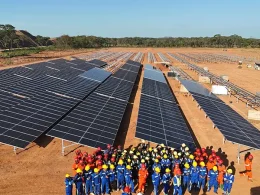Honeywell and AM Green have signed a memorandum of understanding (MoU) at India Energy Week 2025 to evaluate the feasibility of producing sustainable aviation fuel (SAF) from ethanol, as well as green methanol from various carbon dioxide (CO₂) emission sources and green hydrogen. The partnership aligns with Honeywell’s strategic focus on advancing the energy transition and promoting sustainable solutions.
The collaboration aims to strengthen India’s energy security by addressing key objectives, including reducing the country’s dependence on crude oil imports. Additionally, it seeks to establish India as a major global exporter of green methanol, supporting the shipping industry’s transition to low-emission fuels. Furthermore, the partnership will assist airlines in complying with CORSIA mandates by providing low-carbon, drop-in fuel alternatives, reinforcing India’s commitment to sustainable aviation and cleaner energy solutions.
“This partnership with AM Green will accelerate India’s transition to a low-carbon economy and support the government’s SAF blending mandates, establishing India as a frontrunner in alternative fuel innovation,” said Ashish Modi, President of Honeywell India. “By integrating Honeywell’s carbon capture technologies and ethanol-to-jet solution with AM Green’s expertise in green hydrogen and ethanol production, we are taking a significant step towards a sustainable future.”
Mahesh Kolli, Co-Founder and Group President of AM Green said, “We are pleased to partner with Honeywell, a global leader in technology driving the future of energy. This agreement reflects AM Green’s growing leadership in the clean energy transition while contributing to India’s ambition of becoming a leading exporter of sustainable and cost-effective green molecules. The production of green methanol will also aid in the decarbonisation of hard-to-abate sectors such as shipping, steel, and cement.”
Beyond industrial applications, the partnership is expected to benefit Indian farmers by generating demand for ethanol feedstocks. It also aligns with the National Green Hydrogen Mission, which seeks to enhance green hydrogen production for domestic and export markets through green methanol initiatives. The feasibility study is scheduled for completion by mid-2025, marking a crucial step towards large-scale decarbonisation efforts.





















